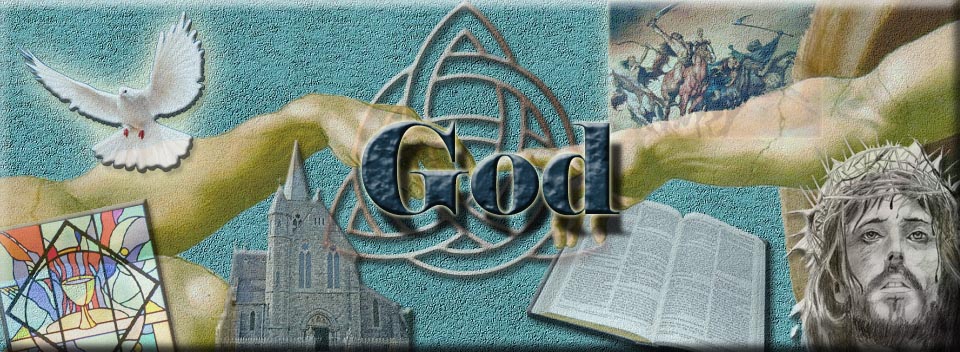
What is meant by "The Trinity"
|
Let me insert here an excerpt from a book: [1] Definition of TermsAdequate definitions of the nature of God, the nature of the Trinity, and the person and nature of Jesus Christ are prerequisite to understanding the many Scriptures concerning the deity of Christ. 1. God: The Scriptures teach that God is personal, intelligent, loving, just, faithful, eternal, creative, and in dynamic interaction with His creation. The attributes of God can be summarized into two groups: general attributes and moral attributes. Robert Passantino states, "God according to His general attributes is unique, eternal, immutable, omnipotent, omniscient, omnipresent, triune, spirit, and personal." He continues, "The moral attributes of God include his holiness, righteousness, love and truth." Christianity teaches that God sustains and sovereignly rules the universe in the present, and, as we will try to show, became incarnate in Jesus of Nazareth. 2. Trinity: Out of all reality or existence, only God is tri-personal or triune. When we say that God is triune, we are labeling the view of God derived from a panorama of Scripture passages that describe the personal nature of God. By triune, from which the word Trinity comes, we mean that God is consistently revealed as subsisting eternally as three persons (Father, Son, and Holy Spirit). These three persons make up the Godhead, yet there is only one God.
1) There is one God and three gods. 2) There is one God and one person with three names or modes or manifestations. 3) There is one God and one person who became three separate and successive persons. 4) There are three gods who are in one "family." 5) The one God is schizophrenic. The biblical doctrine of the Trinity can be summarized as follows. The one true God, as already established (Isaiah 43:10; Deuteronomy 6:4), is made up of Father, Son, and Holy Spirit. Each member of the godhead is called "God" in the Bible. The Father bears the name God (Galatians 1:1; Titus 1:4; etc.). The Son, or Word (logos), is repeatedly called God in verses like John 1:1,14; Acts 20:28; John 20:28; Titus 2:13; Hebrews 1:8, etc. The Holy Spirit is identified as God in various Scriptures (Acts 5:3-4; 1 John 4:2,3; Hebrews 10:15,16). The concept of the unity within the Trinity is seen in a verse such as Matthew 28:19, where the Father, Son, and Holy Spirit comprise one "name" (singular in Greek). Once a person comes to believe in the divinity of Christ, belief in God's existence as Father, Son, and Holy Spirit is usually not a problem. For the person wanting to research what the Bible says on the Trinity, many verses can be studied (Matthew 3:16,17; Mark 1:9-11; Luke 1:35; 3:21,22; John 3:34-36; 14:26; 16:13-15; Acts 2:32,33; 38,39; Romans 15:16,30; 1 Corinthians 12:4-6; 2 Corinthians 3:4-6; 13: 14; Ephesians 1 :3-14; 2:18-22; 3:14-17; 4:4-6; 2 Thessalonians 2:13,14; 1 Timothy 3:15,16; Hebrews 9:14; 10:7; 10-15; 1 Peter 1:2; to name a few). 3. Jesus Christ: "Jesus Christ" is both a name and a title. The name Jesus is derived from the Greek form of the name Jeshua or Joshua meaning "Jehovah-Savior" or "the Lord saves." The title Christ is derived from the Greek word for Messiah (or the Hebrew Mashiach - Daniel 9:26) and means "anointed one." Two offices, king and priest, are involved in the use of the title Christ. That title points to Jesus as the promised priest and king of Old Testament prophecies. Beyond that, we believe that Jesus possesses two natures, the human and the divine; thus we hold the view that Jesus is fully God (in nature) and yet fully human - God revealed in human form. The Bible describes Jesus' dual nature as both God and man like this: Have this attitude in yourselves which was also in Christ Jesus, who, although He existed in the form of God [His divine nature] did not regard equality with God [the Father] a thing to be grasped [held on to] but emptied Himself, taking the form of a bond-servant [form number two, his human nature] and being made in the likeness of men. And being found in appearance as a man, He humbled Himself by becoming obedient to the point of death, even death on a cross. Therefore also God [the Father] highly exalted Him, and bestowed on Him the name which is above every name, that at the name of Jesus every knee should bow [worship] of those who are in heaven, and on earth, and under the earth, and that every tongue should confess that Jesus Christ is Lord [God the Son], to the glory of God the Father. (Philippians 2:5-11) [1] taken from "Jesus: A Biblical Defense of His Deity" by Josh McDowell & Bart Larson, (c) 1983, ISBN 0-86605-114-7 |
-
Site Navigation
 Home
Home What's New
What's New Bible
Bible Photos
Photos Hiking
Hiking E-Books
E-Books Genealogy
Genealogy Profile
Free Plug-ins You May Need
Profile
Free Plug-ins You May Need
 Get Java
Get Java.png) Get Flash
Get Flash Get 7-Zip
Get 7-Zip Get Acrobat Reader
Get Acrobat Reader Get TheWORD
Get TheWORD